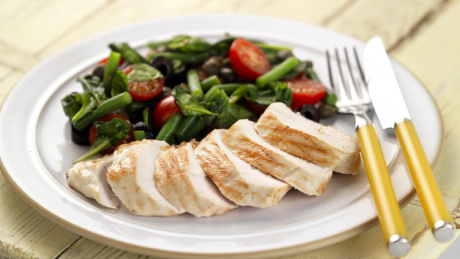Post-workout meal strategy
Your post-workout meal plays a crucial role in building and repairing muscle. Follow these rules to maximise your gains

Sign up for workout ideas, training advice, reviews of the latest gear and more.
You are now subscribed
Your newsletter sign-up was successful
Pop quiz, hotshot: what’s the most important meal of the day? If you said ‘breakfast’, you’re wrong – according to both scientific research and anecdotal evidence, it’s the one you eat post-workout. As the University of Texas, ‘Performance of resistance exercise sensitizes the muscle to the anabolic effect of amino acids.’ As a result, doing resistance training increases protein synthesis, helping your muscles to repair themselves from micro-trauma and come back stronger. But how do you do it best? There are some simple rules to follow when it comes to your post-workout meal.
The tips
1. Eat as soon as possible
Research from the American Journal of Physiology shows that waiting even three hours after a workout for your meal drastically reduces protein synthesis. Try to eat within an hour of leaving the gym.
2. Make protein the foundation
Research shows that you need amino acids to prevent muscle catabolism. That means that protein should be the foundation of your meal. For reference, a decent portion of meat is roughly the size of a deck of cards.
3. Don’t neglect carbs
There are two reasons for this. Firstly, insulin sensitivity goes up after a workout, so carbs are less predisposed to be stored as fat. Your body’s primed to take on nutrients, so take advantage. Secondly, you need carbs to refuel your glycogen stores and get ready for the next session. Sweet potatoes and wholemeal rice are good options: don’t be scared of them.
4. Think 1:1
Based on the above, nutritionist Nate Miyaki recommends a 1:1 ratio between carbs and fat in your post-workout meal, regardless of the time of day you train. So have some carbs – and enjoy them!
The benefits
1. Increased protein synthesis
When your bodies endured a pretty strenuous workout it is biochemically primed to start sucking in nutrients. Our muscles are highly sensitive to insulin, meaning that the carbohydrates consumed can help to shuttle protein into your muscles, instead of it being converted into dreaded fat. Insulin tends to get a bit of a bad rep because it plays quite a big role in fat storage. However, after a workout insulin is one of your best friends, helping to increase fat loss and improve muscle building.
2. Replenishment of Glycogen
Whatever the type of workout you're doing, as long as you're working out intensely your body will use up glycogen as fuel. Glycogen, stored up in your liver and in your muscles is best described as the preferred fuel source for your body during a workout. Eating enough carbs after a tough workout not only promotes protein synthesis, it also helps to replenish your energy stores so you don't start feeling like you need a nap throughout the day.
Sign up for workout ideas, training advice, reviews of the latest gear and more.
3. Prevention of muscle breakdown
A taxing strength training workout will result in microscopic tears in your muscle fibers. If you do not provide your body with adequate nutrients post-workout these tears can lead to further muscle breakdown, meaning your muscle is broken down to form protein that your body will use as energy to repair itself. Don't make your body have to take matters into its own hands, feed it post-workout!
4. Speedier recovery
A well-timed post-workout meal with all the correct nutrients can help to decrease any soreness in your muscles for a certain amount of training. If you are able to recover in just one day instead of three days it simply means that you're able to train more frequently, leading to faster gains.
Coach is a health and fitness title. This byline is used for posting sponsored content, book extracts and the like. It is also used as a placeholder for articles published a long time ago when the original author is unclear. You can find out more about this publication and find the contact details of the editorial team on the About Us page.

